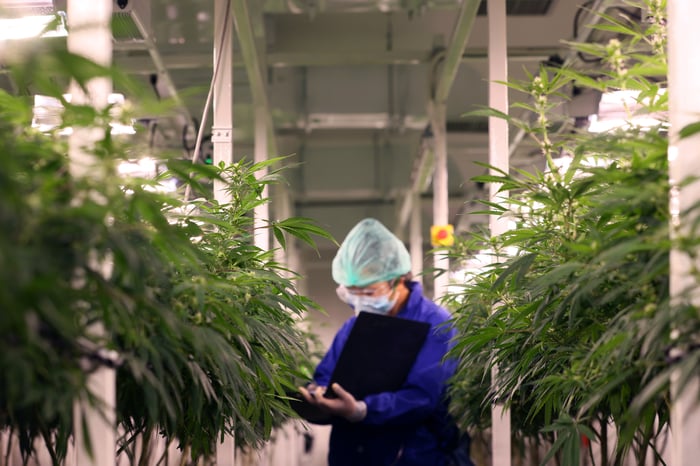Innovative Industrial Properties (IIPR 2.64%) is a pot real estate investment trust (REIT), a category that basically didn't exist before this company's initial public offering (IPO) in late 2016. From day one, the goal was to grow along with the fast-expanding marijuana sector. But nothing goes up or down in a straight line on Wall Street, and Innovative Industrial is facing the first real test of its business model. Here's what's going on and what could happen from here.
A picks-and-shovels play
When the California gold rush took place in the mid-1800s, some people went all in, hoping to strike it rich finding gold. Others sold the tools these gold prospectors would need as they mined their dreams. Selling the picks and shovels was a much more reliable business plan. That is really the logic behind what Innovative Industrial Properties is doing in the marijuana space, with the REIT owning the facilities used to grow cannabis.

Image source: Getty Images.
It's not as exciting a business as growing cannabis, but Innovative provides a valuable service. Essentially, as it buys assets from growers, it helps them fund their expansion efforts. In exchange, it gets a long-term tenant. Part of this process, however, is that the REIT helps to pay for facility upgrades. This leads to higher rents, which is good.
However, those upgrades could become stranded investments if the tenant stops paying rent. Indeed, a new tenant probably wouldn't be willing to pay the same level of rent, since the upgrades are already in place and necessary if the facility is going to be used as a grow house.
Up until July, there was nothing to suggest that Innovative's model was anything but successful. However, as in any property sector, there are some tenants that succeed and some that fall by the wayside. After a good run during the initial "land grab" among cannabis growers, Innovative Industrial has its first tenant, Kings Garden, that is not paying rent. Now the rubber hits the road.
What's going on
Clearly, Kings Garden is no longer paying rent on the properties it occupies. During Innovative Industrial Properties' second-quarter 2022 earnings conference call, management noted that this tenant accounts for around 8% of the overall rent roll. That is a significant sum and can't be ignored by investors. Right now, Innovative Industrial is doing exactly what you would expect -- trying to get Kings Garden to either pay or vacate the properties. But what do the potential outcomes look like?
The best possible resolution would be that Kings Garden manages to start paying rent again at the pre-existing level. If that happens, then there is basically no change to the REIT's business. This is probably not a high-probability outcome, given that companies generally only stop paying rent on vital properties (like a grow house) when they are in severe financial distress.
Alternatively, Kings Garden and Innovative Industrial could work out rent concessions. That would keep the tenant in the property, but would likely mean less rent gets paid each month. There are many ways this could go. Generally the path is either lower rent with a lease extension, or a deferral of rent that is to be paid back at a later date, presumably when the tenant's business is on stronger footing. The two parties are in court right now, which probably isn't a good sign for this outcome.
Innovative Industrial could end up having to evict Kings Garden. That's good in that it could release the properties, but bad in that it may not be able to get the same rental income. Moreover, any investments in the properties for upgrades could end up having to be written off. Sadly, this seems like the highest-probability outcome.
That said, grow houses are highly specific and highly regulated, so a new tenant may not be all that hard to find. There's also a chance that vacated assets will get sold as grow houses, which might allow Innovative Industrial to protect some of the investment it made in the asset.
Another potential outcome is that Kings Garden gets bought and the new owner takes over the company's existing leases. That's the hardest outcome to predict, and one that you really shouldn't rely on.
In an absolute worst-case scenario, Innovative could sell the properties as generic industrial assets. This would be akin to salvaging as much money as possible from the investment, as a shipping company might do by selling a tanker ship to the scrap yard. But the key is that even in this situation, Innovative Industrial could still salvage some of its investment. At this point, it's worth noting that Innovative Industrial Properties' adjusted funds from operations payout ratio in the second quarter was around 82%, leaving some wiggle room for adversity.
Now what
Innovative Industrial Properties' stock has fallen materially, at least partly because of the risk posed by this tenant event. And this is unlikely to be the only troubled tenant the company ever has to deal with, so the concerns about the business model's resilience are real.
Still, given the long-term growth projected for the marijuana sector, it is highly likely that the REIT will survive this test and continue to grow. That could make the historically high 7.4% dividend yield here attractive to more aggressive income investors. However, shareholders should pay close attention to what happens with Kings Garden, because it will basically be setting the bar for future tenant troubles.





